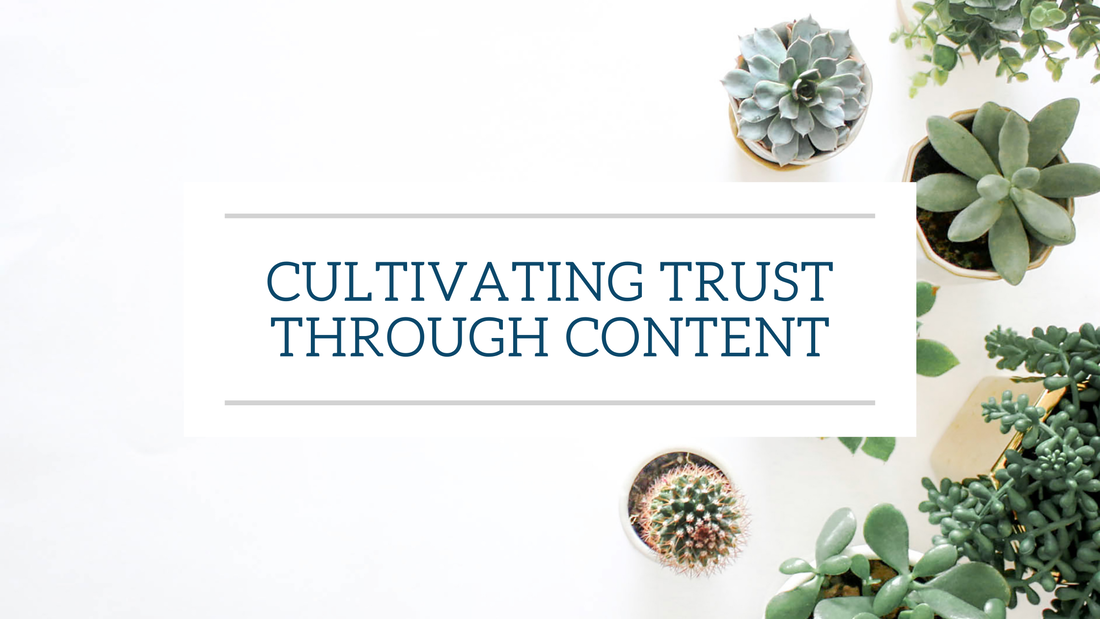|
Some people are still not convinced about the value of content marketing. It seems like a luxury. They can’t draw the direct line between content and the sale, so they see it as a nice to have, rather than a necessity. I’m here to say, “Au contraire, mon ami!” Content can play an integral role in the sales process if you’re using it properly. I had fun writing about marketing in the wild last week, so I’d like to present another real-world example to bolster my position on the importance of content. A Plant-Parent-To-Be
Sometime in the past ten years, “plant parent” became a real thing in millennial culture. Burdened with student loan debt and faced with the horrors of Tinder, we may not be in a position to parent human children, but we’ll fill our apartments with succulents and stylish terrariums, gosh darn it! While I am a proud cat mom, I’ve never ventured into the world of plant parenthood, mainly because my history with plants is sketchy at best. They do not survive in my care; even the “beginner” plants that don’t need much attention wither away at an alarming speed. But sometime in quarantine, I succumbed to the siren song of plant parenthood. I decided to go full Basic Millennial and check out The Sill, an en vogue DTC plant retailer with an Insta presence that would make any wannabe plant parent green with envy (chlorophyll pun fully intended). Sowing the Seeds of the Sale I was initially drawn to The Sill because of its Instagram presence. The Sill’s grid is full of bright, airy, plant-filled spaces. It’s all very boho-chic and mid-century modern. As a visually-focused platform, it’s the visual content that does the heavy lifting here, and to great effect. Photo after photo of lush greenery had me clicking over to its website faster than you can say “ZZ plant.” Once on the site, I found a treasure trove of long-form content to help even the most nervous aspiring plant parent feel at ease. First, there’s an entire plant care library. You can scroll plant by plant and learn about water, sunlight, soil—everything you need to give your little plant babies a beautiful life. The blog has information on a myriad of topics, from repotting orchids to decorating Christmas trees. You can dig deep and find all sorts of plant-related information. The sheer amount of content makes you feel like you’re in good hands. These people know their plants, understand how to teach you about them, and want you to have a great experience. Content Meets UX Then we get to the actual shopping experience. There is nothing worse than a difficult-to-navigate online shopping page. It’s a sin that’s become all the more grave as we’ve shifted culturally toward online shopping (for obvious, pandemic-related reasons) in the past 12 months. Here’s another area where The Sill excels. The site allows you to filter by everything. You can filter by variety of plant, features, and size. What kills me is that you can even filter by pet-friendliness. As the mom of a very curious cat (nickname: Nosy Rosie), finding a non-toxic plant was an absolute must. By demonstrating its mastery of the topic of plant care and making it easy to find the plant that would be perfect for me (low maintenance, kitty-friendly), shopping with The Sill became a no-brainer. The Other Guys I even did a little research once I’d narrowed it down to my two plants of choice to see if I could find the same species for less money elsewhere. I did find them cheaper at other online retailers, but they hadn’t earned my trust like The Sill. They were those vendors with a generic URL and no real personality or point of view, and it’s just so hard to trust a business like that. I’m about to hand my credit card information to a stranger on the internet! I need to know it will not be handed right over to a scammer. Content helps build trust. No phishing website would go through the trouble of thoughtfully writing and curating dozens of blog posts; building beautiful, well-functioning product pages; and posting daily to social media. When you buy from a company that hits the right content marks, you know you’re going to get a plant in the mail, not a request for you to send iTunes gift cards overseas. That’s why content matters. It builds trust. It proves a brand’s legitimacy. It establishes a student-teacher relationship between you and your audience. And it makes it difficult for consumers to turn elsewhere, even if the price is better in some other corner of the internet. Comments are closed.
|
